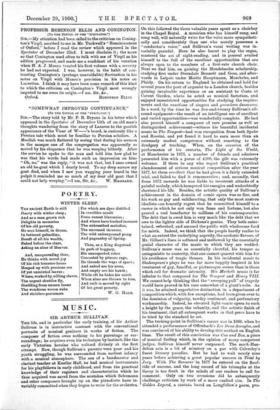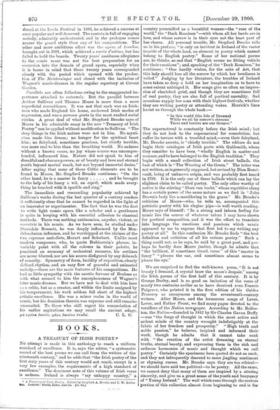MUSIC.
SIR ARTHUR SULLIVAN.
THE life, and in particular the early training, of Sir Arthur Sullivan is in instructive contrast . with the conventional portraits of musical geniuses in works of fiction. ' The composer of fiction owes nothing to his parentage or sur- roundings; he acquires even-his technique by instinct, like the early Victorian heroine who waltzed divinely at the first attempt. Now, though Sullivan's parents were poor and his- youth struggling, he was surrounded from earliest infancy with a musical atmosphere. The son of a bandmaster and clarinet teacher at Smeller Hall, he had musical instruments for his playfellows in early childhood, and from the practical lmowledge of their• registers- and characteristics which he thus acquired was saved from the mistakes. which" Schumann and other composers brought up on the pianoforta hair& in- variably committed when they Vegan to write for the orchestra.
On this followed the three valuable years spent as a choirboy in the Chapel Royal. A musician who has himself sung, and sung well, will naturally write for the voice more sympatheti- cally and considerately than one who merely possesses a. "conductor's voice," and Sullivan's vocal writing was in- variably grateful. Here he also learnt to play the organ, mastered the . art of sight-reading, and in general availed himself to the full of the excellent opportunities that are always open to the members of a first-rate church choir. Next we find him, on gaining the Mendelssohn scholarship, studying first under Sterndale Bennett and Goss, and after- wards in Leipsic under Moritz Hauptmann, Moscheles, and Plaidy. On his return to England he obtained and held for several years the post of organist to a London church, besides gaining invaluable experience as an assistant to Costa at Covent Garden, where he acted as musical factotum, and enjoyed umestricted opportunities for studying the require- ments and the exactions of singers and premieres danseuses. In a word, by the time he was five-and-twenty Sullivan's all- round equipment—the result of an intelligent use of excellent and varied opportunities—was wonderfully complete. He had also proved himself a composer of rare promise 843 well as distinguished achievement—witness his beautiful incidental music to The Tempest—had won recognition from both Spohr and Rossini, and yet found it hard to earn more than an extremely modest competence without resorting to the drudgery of teaching. When, on the occasion of the performance of his oratorio, The Light of the World, at Manchester in 1873, a number of friends and 'admirers presented him with a purse of £200, the gift was extremely welcome. If there be any who regret Sullivan's practical abandonment of serious musical composition after the year 1877, let them recollect that he had given it a fairly extended trial, and failed to find it remunerative ; and, secondly, that from 1872 onwards he was liable to recurrent attacks of a painful malady, which hampered his energies and undoubtedly shortened his life. Besides, the artistic quality of Sullivan's achievement in the domain of comic opera was so fine, and his work so gay and exhilarating, that only the most austere idealists can honestly regret that he committed himself to a career in which he not only won fame and fortune, but also proved a real benefactor to millions of his contemporaries. The debt that is owed him is very much like the debt that we owe to the lighter side of Dickens's genius. They both enter- tained, refreshed, and amused the public with wholesome food for mirth. Indeed, we think that the people hardly realise to what an extent the underlying asperity, the sardonic flavour, of Mr. Gilbert's lines is softened and mellowed by the essentially genial character of the music to which • they are wedded. Sullivan's muse was so essentially cheerful, his temper so antagonistic to austerity, that one cannot quarrel with him for his avoidance of tragic themes. In his incidental music to Shakespeare's plays he was far more happily inspired in his treatment of gay, fanciful, or picturesque scenes than in those which call for dramatic intensity. His Macbeth music is far inferior to that composed for The Tempest and Henry VIII. We cannot help thinking that the "sweeping pall" of tragedy would have proved in his case somewhat of a giant's robe. As it NM% he attained superlative distinction in a department of composition which, with few exceptions, had been given over to the dominion of vulgarity, tawdry sentiment, and perfunctory workmanship. Indeed, he elevated light comic opera to such a height by the grace, the urbanity, and the artistic finish of his treatment, that all subsequent works in that genre have to be tried by the standard he set.
The turning-point in Sullivan's career was in 1866, when he attended a performance of Offenbach's Les Deux Aveugles, and
was convinced of his' ability to develop this method on English
lines. The result of this conviction was Cox and Box, a' piece of musical fooling which, in the opinion of many competent
judges, Sullivan himself never surpassed. The mock-Han- delian aria is a bit of mimicry on a par with Calverley's finest literary parodies. But he had to wait nearly nine
years before achieving a great popular success in Trial by Jury. With The Sorcerer' in 1877 he entered on the flood- tide of success, and the long record of his triumphs at the Savoy is too -fresh in - the minds of our readers to call for comment. • Only on two occasions - did he subsequently challenge criticism by work of a more exalted aim. In The Golden Legend, a cantata based on Longfellow's poem, pro. duced at the Leeds Festival in 1886, he achieved a success at once popular and well deserved. The cantata is full of engaging melody, admirably orchestrated, and in the prologue comes nearer the grand style than any of his compositions. The other and more ambitious effort was the opera of Ivanhoe, brought out in 1891, which achieved a succes d'estime, but has failed to hold the boards. Twenty years' assiduous allegiance to the comic muse was not the best preparation for an excursion into the domain of grand opera, especially when it is borne in mind that those twenty years corresponded closely with the period which opened with the produc- tion of The _Meistersinger and closed with the inclusion of Wagner's music-dramas in the regular repertory at Covent Garden.
Parallels are often fallacious owing to the exaggerated im- portance attached to externals. But the parallel between Arthur Sullivan and Thomas Moore is more than a mere superficial resemblance. It was not that each was an Irish- man who made England his home, eschewed Irish modes of expression, and was a persona grata in the most exalted social circles. A great deal of what Mr. Stopford Brooke says of Moore in his admirable essay in the new " Treasury of Irish Poetry" can be applied without modification to Sullivan. "The deep things in the Irish nature were not in him. No mysti- cism made him dream; no hunger for the spiritual beset him ; no fairyland, sometimes gracious, but chiefly terrible, was more real to him than the breathing world. No sadness without a known cause, no joy whose source was uncompre- headed, influenced him. Nature did not speak to him of dreadful and obscure powers, or of beauty and love and eternal youth beyond mortal reach, but not beyond immortal desire." After saying that none of these Celtic elements are to be found in Moore, Mr. Stopford Brooke continues : "On the other hand, he is a master in fancy and he brought to the help of his fancy a wit, an esprit, which made every- thing he touched with it sparkle and sing."
The immediate and resounding popularity achieved by Sullivan's works during the last quarter of a century renders it sufficiently clear that he cannot be regarded in the light of an innovator or experimenter. The fact that he was the first to write light comic opera like a scholar and a gentleman is quite in keeping with his essential adhesion to classical methods. There was nothing antinomian, angular, violent, or eccentric in his music. As we have seen, he studied under Sterndale Bennett, he was deeply influenced by tle Men-
delssolmian influence, and he worshipped at the shrines of the two supreme melodists, Mozart and Schubert. Unlike most modern composers, who, to quote Rubinstein's phrase, in- variably paint with all the colours in their palette, he practised an economy of orchestral resource, his outlines are never blurred, nor are his scores disfigured by any debauch
of sonority. Symmetry of form, lucidity of exposition, clearly defined rhythm, and an easy flow of graceful and animated
melody,—these are the main features of his compositions. He had as little sympathy with the ascetic fervour of Brahms as with what seemed to him the amorphousness of Wagner's later music-dramas. But we have not to deal with him here :is a critic, but as a creator, and within the limits assigned by his temperament, his work seldom fell short of the highest artistic excellence. His was a minor realm in the world of music, but his dominion therein was supreme and still remains unassailed. To those who still regret his renunciation of his earlier aspirations we may recall the ancient adage,
to) seplaec Aectoiat, xeiptg 13ectoisai 07: Ca El. C. L. G.



































 Previous page
Previous page